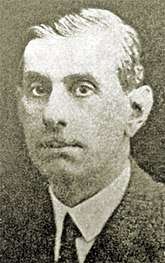Adnan Adıvar
Abdülhak Adnan Adıvar (1882 – 1 July 1955) was a Turkish politician, writer, historian,[1] and by profession a medical doctor.[2] He undertook original research and wrote on the history of science.[3] He was also an early supporter of the nascent feminist movement.[4]
Dr. Adnan Adıvar | |
|---|---|
 | |
| Born | Abdülhak Adnan 1882 |
| Died | 1 July 1955 (aged 72–73) |
| Resting place | Merkezefendi Cemetery, Istanbul |
| Education | Medicine |
| Alma mater | Istanbul University, Humboldt University of Berlin |
| Occupation | Physician, politician, writer and historian |
| Spouse(s) | Halide Edib Adıvar |
Biography
He was one of the intellectuals within Mustafa Kemal Atatürk's circle, active in the Turkish War of Independence with his wife, the author Halide Edip Adıvar.[5] He avoided arrest from the occupying British in Istanbul, who were making a sweep of all Ottoman intellectuals and deporting them to Malta at the end of World War I, by joining the Kemalist forces in Anatolia.
Later he parted ways with Atatürk, disagreeing with the new direction the young republic was taking. He opposed the powers given to Atatürk by the parliament, fearing he was going to be a dictator, as would eventually materialize. He joined the short-lived opposition party "Terakkiperver Cumhuriyet Fırkası" (Progressive Republican Party), and his name was later associated with an attempt on Atatürk's life in 1926 while he was abroad. Even though he was cleared, he stayed in exile until 1939.
Graduated from the Medical Faculty in 1905, Adıvar left for Berlin to specialize in internal medicine. Following the proclamation of the 2nd Constitution at 1908, he came back to Istanbul. As he was close to the Young Turks (Jeunes Turcs), he was appointed as the director of the Medical Faculty at the age of 30. He served in the Red Crescent during the Italo-Turkish War against Italians in Tripoli, participated in the Balkan Wars and World War I. In 1917 he married the novelist Halide Edip, and both joined the team of Mustafa Kemal Atatürk in 1918 when foreign armies occupied Istanbul. In Ankara, Adnan Adıvar was named Minister of Health, Ministry of Internal Affairs and the vice president of the National Assembly between 1920 and 1923.
Following the proclamation of the Republic, he founded in 1924 the opposition party with a small number of deputies. He became the secretary general and did not hesitate to criticize the government. The party was abolished in 1925 on the argument that it backed a rebellion against the government. Disappointed, Adıvar left for Vienna to accompany his wife who needed to undergo medical treatment. Allegation of his involvement in an attempt on Atatürk's life made him extend his stay abroad, where he seems to have developed an interest in philosophy and history of science.
He directed publication of the Turkish edition of the Encyclopaedia of Islam, contributing its introduction and a number of articles. His other significant publication is La Science Chez les Turks Ottomans (Paris, 1939), which can be regarded as a first attempt to present together the activities and accomplishments of Turkish scholars during the Ottoman period, 14th to 19th centuries.[6] His other works include a Turkish translation of Bertrand Russell's Philosophical Matters (1936), a two-volume work in Turkish on science and religion through history, and many essays and articles on cultural and scientific topics.
He held various government and parliamentary positions in the early years of the Turkish Republic. He was a deputy in the first Turkish Parliament in 1920 and again elected there for the 1946-1950 session.
Adnan Adıvar died on 1 July 1955 in Istanbul and was laid to rest at the Merkezefendi Cemetery.
References
| Wikimedia Commons has media related to Adnan Adıvar. |
- Irzik, Gurol. Turkish Studies in the History and Philosophy of Science, p.3. Published by Springer, 2005. ISBN 1-4020-3332-X
- Doktor Aldülhak Adnan Adivar, Halide Edib Adivar (ed.), Istanbul 1956.
- "Medical History in Turkey: A Review of Past Studies and Recent Researches", Feza Günergun, Chair for History of Science, Faculty of Letters, Istanbul University, 34459 Beyazıt – Istanbul
- "A Biographical Dictionary of Women's Movements And Feminisms", Francisca de Haan, Krasimira Daskalova, Anna Loutfi, 2006, ISBN 963-7326-39-1
- Shaw, Stanford, and Shaw, Ezel Kural. History of the Ottoman Empire and Modern Turkey, Vol. 2: Reform, Revolution, and Republic: The Rise of Modern Turkey, 1808 - 1975. Cambridge, U.K., and New York: Cambridge University Press, 1977.
- Abdülhak Adnan-[Adivar], Osmanlı Türklerinde İlim, Maarif Matbaasi, Istanbul 1943